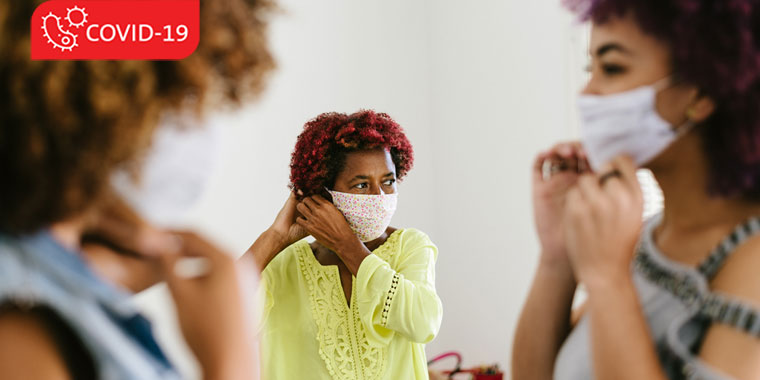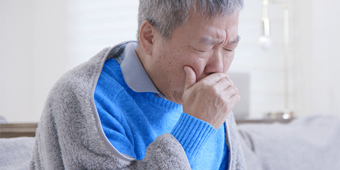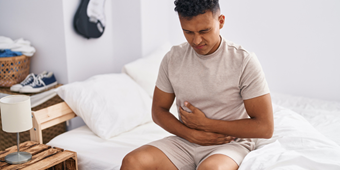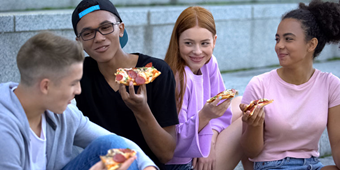Life Hacks As COVID-19 Cases Rise

Answer a few questions and we'll provide you with a list of primary care providers that best fit your needs.
COVID-19 cases are rising in many states, including Ohio. Gov. Mike Dewine recently issued a statewide mask order, saying, “the jury’s back, the verdict’s in: Masks work.”
With this in mind Steven Burdette, MD, medical director of infection prevention at Miami Valley Hospital, shared with Premier Health Now his advice for how to navigate life right now, in the interest of your and your family’s health and those around you. For instance, how to choose a face mask that fits you comfortably while effectively reducing the risk of transmission – and what activities are relatively safe for you and your family and which ones you should avoid.
Face Masks a Key Defense
“One of the reasons we’re having an increase in numbers is not just the fact that we’ve gotten out and about, but that we’ve gotten out and about without wearing masks too much,” Dr. Burdette said.
“The scary thing about this virus, and what makes it so unusual, is now the literature is saying that up to 40 percent of people (with COVID-19) will have zero symptoms. So, you can feel completely normal, be running your 5Ks on the weekend, be doing your normal workout routines, and you could be infected.”
That’s why wearing a mask is important: To reduce the chance you’ll spread the virus, even when you’re not aware you have it.
The University of California-Davis recently reported that research has found that wearing a face covering can also reduce your risk of becoming infected – by 65 percent.
“The masks go both ways. They protect you from picking it up from somebody else, and they also minimize your ability to spread the virus if you are symptomatic or asymptomatic.”
Find a Mask That Fits
When it comes to face masks, one size or style does not fit all. That’s why Dr. Burdette recommends trying different styles to find one that fits you well, and comfortably.
“Now that we’re far enough into the pandemic, there’s much more readily available access to cloth masks. So, if you find one that doesn’t fit well, that’s not comfortable, that you have a harder time breathing in, I encourage you to try different styles of cloth masks.”
He offers these observations about face masks:
- “For nonmedical people, people just going out to the grocery store, I think the cloth masks are going to be way more comfortable and way less restrictive (than N95 masks, which are worn by medical professionals) while still giving you protection.”
- In contrast, he says, “A properly fitting N95 is meant to be extremely tight on your face. And if you wear an N95 too long it can cause skin ulcers and other wounds to develop in and around your mouth and your nose.” And they make breathing more difficult for some.
But, he adds, “If that’s (an N95) the only mask you have, I have no issue.” N95 masks, though, are considered critical supplies for health care workers and other medical first responders. - Thicker cloth masks offer better protection. “The bandanas, where you can actually see somebody’s mouth right through them, I wonder how much filtering you actually get.”
But, he adds, “If your facial shape only allows you to wear a bandana, I’m 100 percent on board with that. I think any kind of physical barrier will decrease your risk of spreading and acquiring the virus.” - A mask that fits your face well lessens the need to touch and adjust your mask, and potentially introduce germs to your mouth, nose, or eyes.
- If you have a beard, you’ll need a larger mask to cover the larger surface area. And because of their tight fit, N95 masks do not work with facial hair.
In some cases, you may need to shave your beard, “or more tightly crop your facial hair.” - “Almost all of us should wear a mask when we’re out in the community, but I don’t expect 100 percent of people to do that. There are some people I honestly think cannot tolerate masks. For some, masks bring on anxiety and they have a hard time breathing.”
- Cloth face masks should be washed daily, unless worn only for a few minutes to run into a store.
Summer Mask-Wearing Tips
How you breathe can help prevent you from overheating under your mask, says Fadi Tayim, PhD, a clinical neuropsychologist and division chief of the Brain Mapping Center at the Clinical Neuroscience Institute.
Breathing through your nose can help you adapt faster to wearing a mask. “There’s less air volume produced from your nose than your mouth. A lot of discomfort occurs from a mask because too much ‘hot air’ accumulates from exhaling from the mouth. Controlled breathing from the nose helps eliminate that.”
Another tip he suggests: Popping a wintergreen mint into your mouth can help cool off under your mask.
What Activities Are Safe?
Dr. Burdette shared criteria he uses for choosing which activities his family participates in away from home:
Outdoors vs. indoors
“Anything outdoors is going to have a lower risk of COVID being spread. With the wind current, the air circulation outside, the virus is not going to linger. So, take advantage of the outdoors.”
Is social distancing within your control?
“If you’re going to an outdoor event where there’s going to be 500 people in a small area, you’re not going to be able to control your social distancing. But if you’re at your son’s or daughter’s T-ball game where all the parents are lining up down the foul lines, I have zero issue with that.”
Dining choices: takeout, on the patio, or in the dining room?
While Dr. Burdette’s family is still primarily getting takeout, they have tried outdoor dining options. “It’s about being able to control your environment,” and as he mentioned above, “I think in general it’s a lot easier to control your outdoor environment than your indoor environment.”
The Burdettes, however, recently ate in a restaurant when they were out of town and had no outdoor options. “But we wore our masks until our iced teas and water were delivered and then we wore our masks after we were done eating.” Plus, their server wore a mask and about half of the restaurants’ tables were out of service. “So we could keep our distance from others.”
Timing makes a difference
When dining or shopping, Dr. Burdette recommends choosing times that are less crowded. “Maybe you do carryout for dinner on Friday night and you do lunch in a restaurant at 2 o’clock on Saturday afternoon, between the crowds.”
Timing applies to other activities like working out at the gym. “If you walk in and there’s only one treadmill, it might not be the right time to work out. If you’re the only person in the gym or nobody’s within 10 feet of you, then I’m OK with it.”
He adds, “Remember that when you’re working out you are going to be breathing harder, which is going to expel the droplets further.” Be sure to wipe down equipment before and after your workout.
Is vacationing a good idea now?
It depends on where you go, what you do, and how you get there.
“Drive, when possible,” he suggests. Dr. Burdette flew recently, but seating was restricted. “I’m a little worried now that they are filling airplanes completely.”
If you do go away, avoid crowds and eat in your condo, cabin, or hotel room as much as possible.
“I have major concerns about amusement parks. Anything where you’re doing a lot of waiting in line, anything where you’re around a large crowd.”
And if you’re choosing a beach, choose carefully. He advises against “going to the beach and being near 5,000 of your closest friends, to where you’re all on top of each other.
“I would just encourage you to be smart. Social distancing, to me, is the key.” As well as wearing a face mask when out in public.
However, if you end up being around crowds on vacation, Dr. Burdette says, “When you come back, I would consider quarantining (for 14 days), especially from the states that have high case rates.”
Going to a house of worship
“My only concerns about churches – and they’re controllable – is number 1, I worry about singing because when you project your voice you’re more likely to spread droplets, and number 2, I worry about people congregating in foyers before and after services.” He suggests arriving early or late and leaving early to avoid crowded conditions.
Be Prepared When You’re Out And About
Here’s what Dr. Burdette recommends keeping in your car so you’re always ready to protect your family, wherever you may go:
Extra face masks for everyone riding with you
Hand sanitizer gel or spray. He recommends using hand sanitizer to frequently clean your hands, rather than protecting your hands with disposable gloves, which can transfer germs.
Wipes for cleaning shopping carts at stores that don’t provide them, or for wiping down a table when you eat outside
Water bottles and a cooler to keep them in since public water fountains are turned off during the pandemic. Bring enough for everyone, as Dr. Burdette says, “This is not the time to be sharing water bottles.”
He adds, “If we’re wearing our masks, if we’re doing our social distancing, if we’re being smart, then I think we can get out of this.”
Answer a few questions and we'll provide you with a list of primary care providers that best fit your needs.
Source: Steven Burdette, MD, medical director of infection prevention at Miami Valley Hospital; Fadi Tayim, PhD, division chief of the Brain Mapping Center at the Clinical Neuroscience Institute; University of California – Davis; NPR






